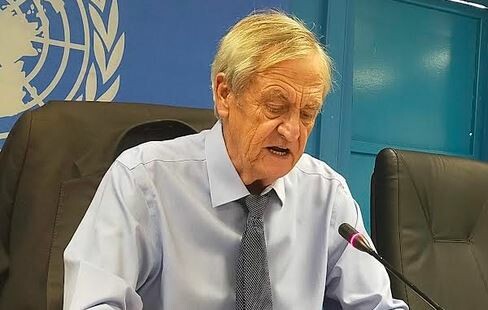The United Nations Mission in South Sudan (UNMISS) on Tuesday said there are indications that the Sudan conflict has spilled over into South Sudan.
The revelation was made by Nicolas Haysom, Special Representative of the UN Secretary for South Sudan and UNMISS Chief, who also said they have heard that there may be recruitment of young men taking place in South Sudan by the warring parties in Sudan to bolster the numbers of their fighters.
“We are worried that the firearms are going to start drifting into South Sudan. These are not issues that we in UNMISS can readily deal with, we do not maintain the border, we do not maintain customs, but we would be keen to alert communities and the authorities,” he stated. “If we can play a helpful role to minimize what could be potentially very disruptive spillover of the conflict, particularly if some of the warring parties in Sudan start to try and link with groups and parties in South Sudan, particularly as the elections get closer.”
He said nearly 550,000 people have crossed into South Sudan from Sudan and that they expect that the number will continue to grow.
“So, what had originally been thought would be a much lesser impact just continues to grow and as it grows, it is putting increasing stress on our communities, you will bear in mind that most or certainly the early returnees were South Sudanese,” Haysom said.
Regarding elections in South Sudan, the UNMISS chief said South Sudan is at a crossroads where the country can now choose a path that gives people the opportunity to participate in peaceful and credible elections and there are strong indications that South Sudanese want elections.
“Around 90 percent of the people interviewed in a UNMISS Perception Survey said that elections are important to them, and they intend to vote. Civil society and academics are also advocating for this outcome,” he added. “As we pause here, decisions are needed on the type of elections to be held. Consensus must be reached on a realistic electoral calendar, taking into account operational, logistical, legal, and security issues. Transitional Security Arrangements must be finalized, an electoral security plan must be agreed upon, and the Necessary Unified Forces deployed to provide a secure environment.”
Haysom said intervention is needed at the highest level to resolve tensions in northern Unity State between the SPPDF and SPLA-IO as well as the inter-communal violence in pockets of the country and the fragile situation interface between Dinka Twic, Ngok Dinka, and Nuer communities in Warrap and Abyei.
“This conflict is causing real harm to communities as well as inhibiting an environment of open political competition, which would be a vital part of a healthy democracy,” he said.




